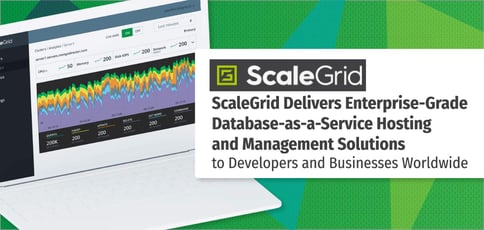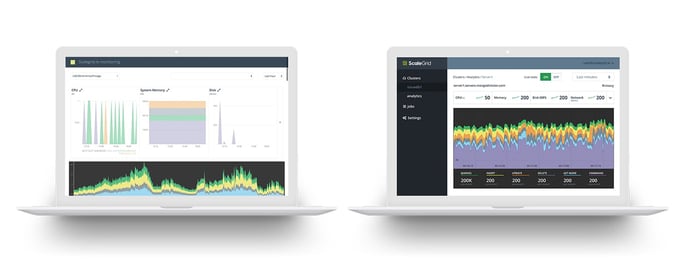
TL; DR: ScaleGrid, a leader in the Database-as-a-Service (DaaS) space, provides a fully managed solution for developers, startups, and enterprises alike. The multilanguage platform supports open-source databases, including MongoDB, Redis, MySQL, and PostgreSQL, on both private and public clouds while automating time-consuming tasks at scale. ScaleGrid’s continuous pipeline of cutting-edge innovations and product updates ensure businesses can continue to focus on their core products, rather than technical operations.
Databases are the lifeblood of modern organizations, enabling them to store customer information, manage payroll, track inventory, analyze data, and predict future trends.
Lose that information, and you’re left with an empty shell of your former company.
“Databases are the most valuable part of any tech stack because that’s where the organization’s data is stored,” said Dharshan Rangegowda, Founder of ScaleGrid. “You must ensure that you devote the same attention to databases that you are giving to other parts of the tech stack — such as versioning, upgrades, and monitoring.”

ScaleGrid delivers fully managed Database-as-a-Service solutions.
But database management isn’t an easy task. ScaleGrid’s 2019 Database Trends report surveyed developers, engineers, software architects, and IT leaders for insight into the most time-consuming database management duties. Of the numerous tasks involved in maintaining healthy production deployments, the majority of respondents (12.3%) said monitoring consumed the most time, followed by backups, managing disk space, scaling, and joining tables (11.6% each).
That’s where ScaleGrid can help. “The overall goal is to provide a polyglot Database-as-a-Service (DaaS) solution where we handle the operational tasks of running a production database so that customers can focus on their regular tasks,” Dharshan said.
The fully managed service automates time-consuming tasks at scale. It supports MongoDB, Redis, MySQL, and PostgreSQL on both public and private clouds, including AWS, Azure, DigitalOcean, and VMware, in addition to other on-premises solutions. With a full pipeline of cutting-edge innovations and updates, ScaleGrid is working to ensure businesses save time, improve performance, and reduce the costs involved in managing their most valuable assets.
Managed Services for Top Open-Source Databases
Dharshan said the only constant in the rapidly evolving tech industry is change — and it hasn’t been any different for ScaleGrid since the company’s founding in 2012. “Either your software stack or your cloud computing platform will change, and databases are continuously evolving as well,” he said. “It’s a constant process.”
ScaleGrid frequently polls industry leaders to gain insight on database and infrastructure trends. The company’s 2019 Open Source Database Report, for example, indicated that relational databases (SQL), commonly used when handling structured data, are most popular. Nonrelational databases (NoSQL), are less frequently used but valuable when storing and retrieving unstructured data using a dynamic schema.
In terms of database popularity, 38.9% of respondents surveyed for the report said they use MySQL most often, followed by MongoDB (24.6%), PostgreSQL (17.4%), and Redis (8.4%).

The ScaleGrid platform supports MongoDB, Redis, MySQL, and PostgreSQL on both public and private clouds.
In recent years, the company has also observed a growing trend toward polyglot persistence: the practice of using multiple databases to handle different needs within a single software application. ScaleGrid’s Open Source Database Report revealed that organizations typically leverage 3.1 database types for their applications.
Dharshan said many companies have separate databases for specific solutions, such as document storage and financial data. And ScaleGrid makes it easy to manage them all.
“My favorite aspect of ScaleGrid is that we offer a polyglot solution where we can manage all your databases in one place,” he said. “We provide a single pane of glass to manage databases uniformly across the entire enterprise.”
Scalable Support for On-Premises and Public Cloud
Today, more businesses than ever are embarking on digital transformation journeys with the goal of using new technology, such as cloud computing, to solve old problems. But these projects can’t be completed overnight.
“The cloud transition is not an easy one for larger enterprises — the technology is different, the workflow is different, and they need an opportunity to get their feet wet,” Dharshan said. “We are one of the only providers that can support both on-premises as well as public cloud.”
Because the digital transformation process involves a learning curve, ScaleGrid recommends a five to six-year transition for any large enterprise looking to leverage the cloud in a significant way.
“There are a lot of benefits but also a lot of pitfalls,” Dharshan said. “It’s often a good idea to start with a noncritical part of your tech stack, and then once you’re confident, start moving more to the cloud.”

Nearly 50% of respondents to a 2019 survey conducted by ScaleGrid deploy databases on-premises.
According to ScaleGrid’s 2019 Database Trends report, the majority (49.5%) of open-source database deployments are still run on-premises, followed by public cloud (36.7%) and hybrid cloud (13.8%).
ScaleGrid also studied trends specific to PostgreSQL, an open-source relational database that is quickly gaining popularity among database administrators. As indicated in the 2019 PostgreSQL Trends Report, a whopping 59.6% of PostgreSQL users host clusters on-premises, as opposed to public cloud (34.8%) and hybrid cloud (5.6%) solutions.
New, Fully Managed PostgreSQL Hosting Solutions
ScaleGrid recently announced support for open-source PostgreSQL hosting on AWS and Azure. This offering will prove especially useful for organizations looking to modernize their legacy deployments, as PostgreSQL has rapidly gained popularity in both cloud and on-premises deployments. In addition, many companies are shifting from commercial databases to open-source for dramatic cost savings.
“The demand for PostgreSQL has absolutely skyrocketed over the past year,” Dharshan said in a July 17, 2019, press release. “Organizations have been looking for an affordable alternative to Oracle to escape their high cost of service, and PostgreSQL fits the bill, not only in cost but also in capability and performance.”
With ScaleGrid, IT professionals can automate backups, upgrades, scaling, encryption, replication, OS patching, and alerts — allowing them to avoid human error while diverting attention to other pressing tasks. In addition, the company enables PostgreSQL users to maintain total control over their deployments with both SSH and superuser access, making it easier to adopt a managed database service.
According to ScaleGrid’s 2018 report on PostgreSQL trends, the majority of PostgreSQL users (31%) say the most time-consuming aspect of PostgreSQL management involves queries. To that end, ScaleGrid offers a tool known as the PostgreSQL Slow Query Analyzer that allows users to quickly identify slow queries and take action accordingly.
Continuous Updates and a Rapid Production Cycle
When it comes to internal development, Dharshan said ScaleGrid leans heavily on customer feedback.
“We have a lot of boots on the ground and are constantly reaching out to customers,” Dharshan said. “We also receive a lot of tickets requesting new features. When they’re asking for more, our job is to give it to them.”
In January, for example, ScaleGrid announced support for Redis Cluster, a native sharding implementation, on its fully managed hosting plans. With Redis Cluster, users can automatically employ horizontal partitioning across multiple Redis nodes without having to rely on external tools and utilities.
This summer, the company announced that it would expand its fully managed MySQL Hosting services to support AWS cloud. Through a Bring Your Own Cloud plan, users can even host MongoDB, Redis, and MySQL clusters through their personal AWS account.
Smaller updates are released regularly. “For us, everything is about shipping code, so we try to release once a week,” Dharshan said.
HostingAdvice.com is a free online resource that offers valuable content and comparison services to users. To keep this resource 100% free, we receive compensation from many of the offers listed on the site. Along with key review factors, this compensation may impact how and where products appear across the site (including, for example, the order in which they appear). HostingAdvice.com does not include the entire universe of available offers. Editorial opinions expressed on the site are strictly our own and are not provided, endorsed, or approved by advertisers.
Our site is committed to publishing independent, accurate content guided by strict editorial guidelines. Before articles and reviews are published on our site, they undergo a thorough review process performed by a team of independent editors and subject-matter experts to ensure the content’s accuracy, timeliness, and impartiality. Our editorial team is separate and independent of our site’s advertisers, and the opinions they express on our site are their own. To read more about our team members and their editorial backgrounds, please visit our site’s About page.

